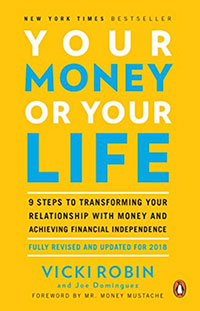
The point: Time is our most valuable asset and if we squander the money we earn by chasing possessions and always wanting more, we end up having to work longer and use up more of our limited time generating income.
Who is the book for: Anyone who is starting to get an inkling that the great American rat race isn’t leading them to feelings of fulfilment.
Key points: By thinking about the money we spend in terms of trading away our life energy in exchange for money, we can become more conscious about our spending and the things that are costing us money but not bringing us any fulfillment.
Deciding on what is important to you and really enjoy those things while practicing extreme frugality towards those things that are not bringing us enjoyment.
Notes:
I read this book for the first time in the late 1990s when my much younger self was feeling a bit disenfranchised by other people feeling as if I needed to conform to their ideas about what a successful life looks like and what possessions it includes. Each person’s life is their own and you need to decide for yourself what is important and not constantly seek external validation.
Financial Independence has nothing to do with rich. It is the experience of having enough—and then some.
Frugality is enjoying the virtue of getting good value for every minute of your life energy and from everything you have the use of.
Waste lies not in the number of possessions but in the failure to enjoy them.
When you add up all the money you spend on having a job, the cost is more than you think (or you’re earning less than you think). When you factor in the time spent commuting, the lunches out, the clothes needed to look professional, the hourly rate you are earning is drastically less than what it is on paper.
I used to work with someone who held the highest position in my organization for what we do (and with the most responsibilities) who quit that position after doing it for several years and took the lowest paying job with the least responsibility in our profession and everyone thought he was crazy. His reasoning was that he had made the most he could make for social security benefits and he wanted to have less stress and more time. That turned out to be the best decision he ever made because he only lived 5 more years and had an untimely death before the age of sixty.
In the end we each need to decide our own point where we feel we have enough. Having less would make us stressed and worried about our future. Once we’ve determined our individual tipping point, we can then make sure we are spending our money in alignment with our values.
Related Readings:
I Will Teach You to Be Rich by Ramit Sethi. This book is clearly influenced by Your Money or Your Life. The point is that anyone can be rich -it’s just a question of what rich means to you. In order to live the life you want, decide what you value and spend money (without guilt) on those things but cut money ruthlessly from things that are not important to you.
Die With Zero by Bill Perkins. Money is a resource to help us live our best lives. This book is aimed at people who have financial security and the idea behind it is spend money on experiences throughout your life and if you die with a big bank account you missed the point.
Thanks for posting. I really enjoyed reading it, especially because it addressed my problem. It helped me a lot and I hope it will help others too.